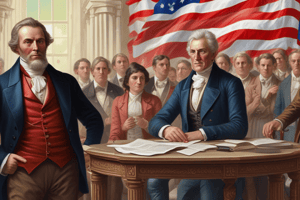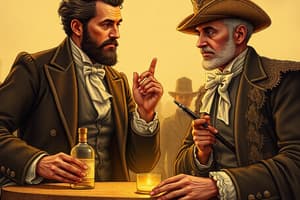Podcast
Questions and Answers
What does the term 'Corrupt Bargain' refer to?
What does the term 'Corrupt Bargain' refer to?
- The establishment of the Democratic Party
- The event leading to the Panic of 1837
- The election of Andrew Jackson
- The presidential election of 1824 where Henry Clay convinced the House to elect Adams (correct)
Who was Daniel Webster?
Who was Daniel Webster?
A leading attorney and Congressman from New Hampshire, senator representing Massachusetts.
What is the Democratic Party?
What is the Democratic Party?
A political party formed by supporters of Andrew Jackson after the presidential election of 1824.
What is 'Exposition and Protest'?
What is 'Exposition and Protest'?
What was the Indian Removal Act?
What was the Indian Removal Act?
Who was John C. Calhoun?
Who was John C. Calhoun?
Who was John Quincy Adams?
Who was John Quincy Adams?
What was the Market Revolution?
What was the Market Revolution?
What does 'Nullification' mean?
What does 'Nullification' mean?
What was the Panic of 1837?
What was the Panic of 1837?
What are 'Pet Banks'?
What are 'Pet Banks'?
What is the Specie Circular?
What is the Specie Circular?
What is the Spoils System?
What is the Spoils System?
What was the Tariff of Abominations?
What was the Tariff of Abominations?
What does the term 'Trail of Tears' refer to?
What does the term 'Trail of Tears' refer to?
Who were the Whigs?
Who were the Whigs?
Flashcards are hidden until you start studying
Study Notes
Vocabulary: Corrupt Bargain and Key Figures
- Corrupt Bargain: Refers to the 1824 presidential election where Henry Clay influenced the House of Representatives to elect John Quincy Adams over Andrew Jackson, sparking controversy.
- Daniel Webster: Prominent attorney known for significant Supreme Court cases; served as a congressman and senator from New Hampshire and Massachusetts, respectively.
- John Quincy Adams: Sixth president, son of John Adams, key architect of the Monroe Doctrine, later became a congressman after his presidency.
Political Developments and Events
- Democratic Party: Emerged from the supporters of Andrew Jackson post-1824 election, emphasizing populism and states' rights.
- Exposition and Protest: Written by John C. Calhoun in reaction to the Tariff of 1828; advocated for state nullification of federal laws deemed unconstitutional.
- Indian Removal Act: Congressional legislation permitting the forced relocation of Native American tribes from east of the Mississippi River to designated territories.
Economic and Social Theories
- Market Revolution: Significant economic transformation between 1820 and 1850 marked by increased goods and services exchange, driven by agricultural and industrial output, trade, and enhanced transportation networks.
- Nullification: Concept asserting a state's right to nullify federal laws; championed by John C. Calhoun as a response to perceived constitutional violations.
Financial Crises and Policies
- Panic of 1837: Economic recession resulting from reckless state bank lending and market speculation; Martin Van Buren's presidency focused on economic stabilization.
- Pet Banks: Term used for state banks favored by Jackson, eliminating the Second Bank of the United States; this term reflects the political conflict surrounding Jackson's banking policies.
- Specie Circular: Executive order by President Jackson, mandating public land purchases be made in gold or silver to curb rampant speculation and stabilize the economy, albeit contributing to the Panic of 1837.
Governance and Controversial Legislation
- Spoils System: Practice of appointing supporters to government positions after electoral victories, leading to workforce turnover and potential inefficiency.
- Tariff of Abominations: 1828 tariff enhancing Northern manufacturing at the expense of Southern economics, triggering widespread dissent in the South.
- Trail of Tears: Forced displacement of Cherokee Indians over 800 miles to Indian Territory, resulting in significant mortality due to harsh conditions.
Opposition Parties
- Whigs: A political party opposing Andrew Jackson, advocating for a strong national community and proactive government engagement.
Studying That Suits You
Use AI to generate personalized quizzes and flashcards to suit your learning preferences.




